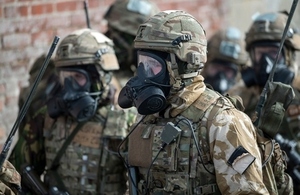Toxic Dagger
 | |
| Date | 20 February 2018 - 12 March 2018 |
|---|---|
| Location | Salisbury, Wiltshire |
| Website | https://www.gov.uk/government/news/exercise-toxic-dagger-the-sharp-end-of-chemical-warfare |
| Interests | chemical weapons |
| Description | The largest chemical warfare exercise in the UK, coinciding with the Skripal Affair. Held February 2018. |
| Participants | Public Health England, Atomic Weapons Establishment, Defence Science and Technology Laboratory, Porton Down, Royal Marines |
Toxic Dagger was a British three-week military exercise including company-level attacks and various Chemical/Biological/Radioactive/nuclear (CBRN) scenarios "based on the latest threats for ultimate realism, such as a raid on a suspected chemical weapons lab."[1]
Skripal affair
- Full article: Skripal affair
- Full article: Skripal affair
Toxic Dagger coincided uncannily with the Skripal affair, where the Russian-born British spy Sergei Skripal and his daughter Yulia were alleged by British authorities to have been poisoned with the chemical weapon Novichok by a couple of Russian assassins, who as Kit Knightly noted, "never once behaved like Russian assassins".[2]
Overview
Toxic Dagger was the largest chemical weapons exercises of its kind in the UK, and involved Public Health England, the Atomic Weapons Establishment and the government’s military labs, Defence Science and Technology Laboratory at Porton Down.
Toxic Dagger climaxed with a full-scale exercise involving government and industry scientists and more than 300 military personnel, including the RAF Regiment and the RM Band Service. Casualty treatment was a key part of the Salisbury Plain exercise. A chemical decontamination area was set up not merely to treat ‘polluted’ commandos, but also any wounded prisoners they may have brought in; once cleansed casualties can be treated in field/regular hospitals.
“Because the threat is a technical, scientific one, the ability to reach out to organisations with specialist skills greater than ours is crucial,” said Lieutenant Colonel Paul Maynard, 40 Cdo’s Commanding Officer.
“It is vital we can make rapid decisions and are able to protect and support specialists who come in to deal with any incident. On operations these specialists are on hand to advise and we must ensure we already have a strong understanding of their capabilities and what they require of us as a military force,” said Major Rob Garside.
Known Participant
1 of the 4 of the participants already have pages here:
| Participant |
|---|
| Defence Evaluation and Research Agency |